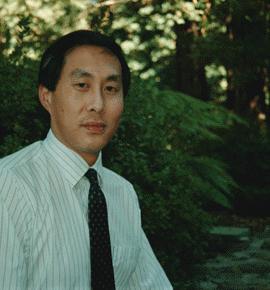![[Currents header graphic]](/homeart/currents_header.gif)
![[Currents header graphic]](/homeart/currents_header.gif)
March 9, 1998

|
|
Kirk Lew
|
Over the past few years, the UCSC administration has implemented a new financial information system and transferred many of the responsibilities for purchasing, making payments, tracking budgets, and other financial matters from a few central offices to three dozen Service Centers on campus.
Kirk Lew, assistant vice chancellor for financial affairs, believes this decentralization will provide staff and faculty with greater flexibility to manage their resources, improve efficiency, and enable future campus growth. But this transformation has also changed the campus business risk environment, he added.
"We've got a lot more people making financial decisions than in the past, and we haven't fully assessed how all the changes that have taken place affect our ability to meet the public expectations of our financial stewardship," said Lew. "It's critical to our success as a campus to be able to meet the public trust over the long term."
A new program, dubbed the Campus Financial Management Program, is anticipated to help UCSC meet those goals. UCSC is a pilot campus for this program. Similar programs will be launched at all of the other UC campuses.
In the first phase of UCSC's Financial Management Program, information is being gathered from faculty, administrators, and staff about the current condition of the campus's financial accountability environment and system of financial controls.
During the second phase, new programs and resource materials will be developed to address the concerns identified in the first phase. A steering committee made up of 16 faculty, administrators, and staff has been assembled to guide the entire process.
"We're interested in the big picture--the campus culture and ethics, what people see as preventing them from doing things properly," said Lew, chair of the steering committee. "We'll be looking into whether people are adequately trained in managing and handling campus business and whether they fully understand their roles and their responsibilities. We'll ask what we should do to improve the campus's financial management and how it should be done."
People all across campus will be tapped to participate in the program, from staff who regularly make purchases or review financial reports to faculty who manage departmental funds and sponsored-research funding.
The first phase of the program started in January with interviews of 35 members of UCSC's faculty and staff. Early this month, an additional 300 staff and faculty will be asked for their views on campus financial controls via a confidential survey. These 300 will also be invited to an interactive conference on April 2, where results of the surveys will be discussed.
Lew expects to leave the April conference with a general consensus from the campus community about what concerns should be addressed in phase two of the program.
He predicts phase two will start in the fall and may include developing educational materials and programs for managers and staffs of the 36 Service Centers, developing an administrative code of ethics, and providing consulting services. Service Centers handle a large percentage of the financial transactions on campus.
It's a good time for UCSC to get feedback on how the decentralized financial system is working, said Cashier's Office manager Andres Vasquez, a member of the steering committee. "I would hope the program would strengthen our financial accountability as a campus and help us focus on the same goals and objectives as a team," he said.